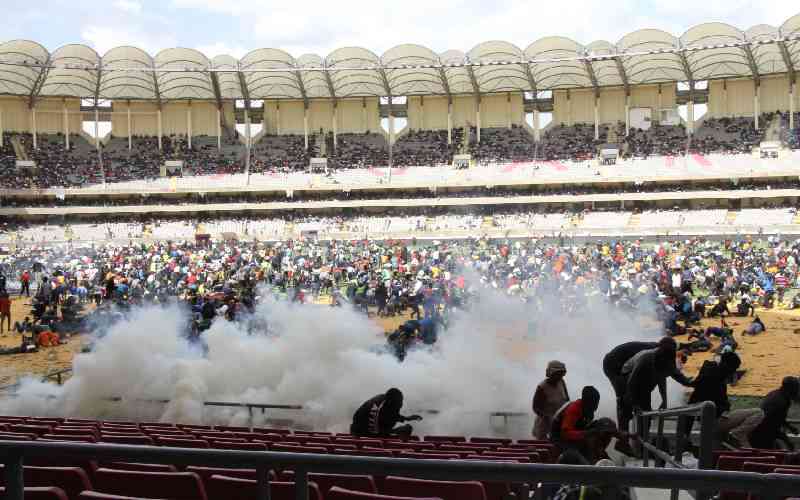Police lob teargas canisters at mourners during the public viewing of the body of former Prime Minister Raila Odinga at Kasarani Stadium in Nairobi, on October 16, 2025. [David Gichuru, Standard]
As Kenya mourns the death of former Prime Minister Raila Odinga, some families have been mourning for entirely different, yet related reasons. On Friday, during the planned viewing of Raila’s body at Kasarani Stadium, police opened fire on the unsuspecting public, leading to the deaths of a number of people. Similar incidences of police brutality have been reported in other parts of the country. These incidences are sadly not isolated, coming after months of discussions about police brutality and the callous taking of life by the State.
Is this now par for the course for the people of Kenya? For police to claim they opened fire on protesters due to a threat to peace is one matter, even though it is far from valid. Two days prior to the viewing of the body, the High Court declared that the use of excessive force by the National Police Service (NPS) during the 2024 protests was unconstitutional. Justice Mugure Thande found, inter alia, that the use of water cannons, live ammunition, rubber bullets and teargas violated articles 26, 29 and 37 of the Constitution, which guarantee a right to life, freedom from torture, and the right to protest. Whilst NPS sought to argue that the protesters were not peaceful and were carrying crude weapons, the judge ruled that the police failed to provide warning before opening fire, which was beyond their statutory mandate.
With this in mind, to open fire on people who are gathering simply to mourn their hero, whose only crime was love for their country and who were completely unarmed, is another matter altogether, and calls to our attention the fact that the State has no regard for the lives of ordinary Kenyans. If police are acting beyond their mandate when shooting at armed protesters, then they are completely beyond repair in shooting at mourners. The trigger-happy nature of the police is what ought to be questioned. Why is it that our forces are so sure that they will get away with literal murder, even when there are so many avenues for oversight? Could it be because of the messaging that they receive from those they take orders from?
Follow The Standard
channel
on WhatsApp
The doublespeak from the government regarding police brutality is nothing short of confusing and an insult to the masses as the State absolves the officers of any direct wrongdoing. Only a few months ago, the President and Interior Cabinet Secretary were debating whether protesters ought to be shot to be killed or maimed.
These jarring sentiments were followed up by the formation of a commission to address the compensation of victims of protests. Amorphous in its definition, the commission sought to address claims of police brutality without terming them as such, preferring instead to present the violence as springing organically as a consequence of protests, even though protests remain peaceful events until police step in with their tear gas and bullets.
Following last week’s killings, it seems that affairs of the State that involve the public cannot proceed without violence against the people. Besides that, police violence on the streets and in police stations continues unabated. Everyday on social media, posters are put up of innocent civilians who are being held unlawfully, and occasionally news is shared of sudden deaths under police custody.
Our lives have become disposable and where enough alarm is raised, the matter is quickly solved by monetary compensation. But life is much more precious than our government would have us think. Important conversations need to be had about the nature of policing and our police forces, beyond calling for superficial reforms and accepting hush money.
Ms Gitahi is an international lawyer
Follow The Standard
channel
on WhatsApp
By Njahira Gitahi
